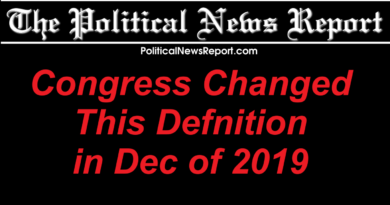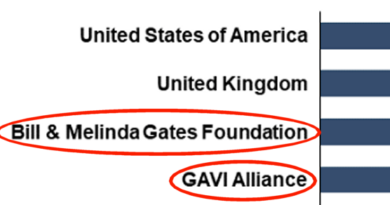The WHO’s Largest Non-State Contributor: Bill & Melinda Gates Foundation
The Unelected WHO
The World Health Organization, or the “WHO”, is a specialized agency of the United Nations. A “specialized agency” of the UN is simply an international organization that works with the UN. It is headquartered in Geneva, Switzerland and has 7,000 people working in over 150 countries.
Per the WHO’s constitution, the “objective of the World Health Organization … shall be the attainment by all peoples of the highest possible level of health”. According to their website the WHO “works worldwide to promote health, keep the world safe, and serve the vulnerable.”
The governing bodies of the WHO are comprised of delegates chosen by the respective member states, who then select the Director-General and the WHO Executive Board. The current Director-General is Tedros Adhanom Ghebreyesus, Ph.D.
The WHO Top Ten Contributors

The WHO has two main sources of funding. The first comes from member states that pay “assessed contributions”, which are essentially a country’s membership dues. Assessed contributions cover less than 20% of the WHO’s total budget. The second source of funding, that accounts for over 80% of the WHO’s total funding, comes from voluntary contributions from member states and “other partners”.
Based on both assessed contributions and voluntary contributions, the United States of America far outstrips any other contributors. That’s hardly surprising, but what should be of note is who makes up the top ten list of financial contributors to the WHO (2018/2019 biennium):
- United States of America: $851.6 million;
- United Kingdom: $463.4 million;
- Bill & Melinda Gates Foundation: $455.3 million;
- GAVI Alliance: $388.7 million;
- Germany: $358.8 million;
- UNOCHA: $258.7 million;
- Japan: $233.9 million;
- European Commission: $213.3 million;
- Rotary International: $168.0 million;
- National Philanthropic Trust: $115.9 million.
Gates Contributes How Much?
Two things on this list stand out. The first is that half of the top ten contributors to the WHO’s budget are not governmental entities. Personally, I would have assumed that the bulk of the funding for such an organization, if not all of it, would come from member-state governments. But according to the WHO’s own reporting, that is not the case.
The second thing that stands out is the fact that the Bill and Melinda Gates Foundation is almost tied with the UK, one of the most powerful nations on the planet, for the number two spot. This organization also beats the entire world in terms of financial contribution to the WHO, except for the United States and the United Kingdom.
But wait, there’s also GAVI
Number four on the top ten list of WHO contributors, just behind the Gates Foundation, is the GAVI Alliance (previously called the Global Alliance for Vaccines and Immunization). GAVI is also an international, non-governmental organization that who’s mission is to expand the vaccination of children around the world. Who is the single largest contributor to GAVI? You guessed it, the Bill and Melinda Gates Foundation, far outstripping any other single contributor including any nation-states.
Correction: after publication of this article it was discovered that while Bill and Melinda Gates Foundation contributions to GAVI outstrip that of any other single non-governmental contributor, the United Kingdom has actually contributed and pledged far more money to GAVI’s coffers. Apologies for the oversight.
How Independent Can the WHO Be?
While it’s understandable that a non-profit entity may seek contributions from all possible sources, the WHO is not just another non-profit organization. Per the WHO constitution, some of its stated functions:
- to act as the directing and coordinating authority on international health work;
- to propose conventions, agreements and regulations, and make recommendations with respect to international health matters;
- to provide information, counsel and assistance in the field of health;
- and to assist in developing an informed public opinion among all peoples on matters of health.
These stated functions of the WHO establish an internationally recognized leadership role regarding matters of public health, which we have seen increasingly on display in the twenty-first century. What kind of influence do these relationships give Bill and Melinda Gates over this international organization charged with “directing and coordinating authority on international health work”? What kind of power does that give these two people over the healthcare and biosecurity policies where you live?
The Political News Report was created in the interests of informing the public and your help is needed to spread the word. Please share this article and website on social media, and also like and subscribe so other people can find this content.
Become a Political News Report Patron for $1 per month at Patreon.


